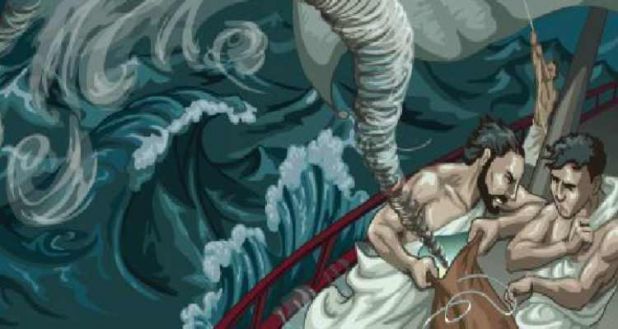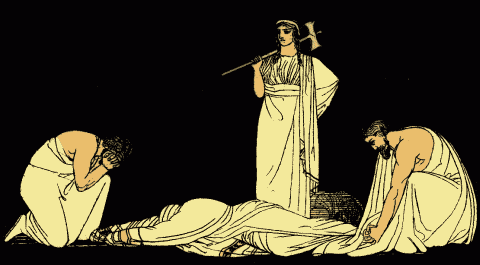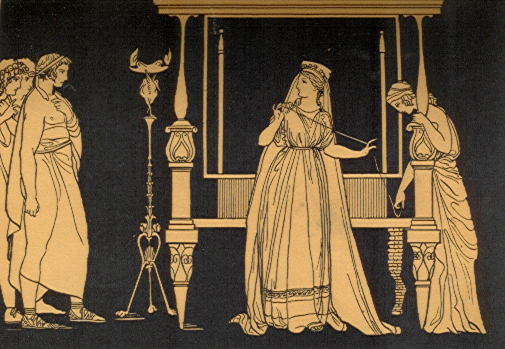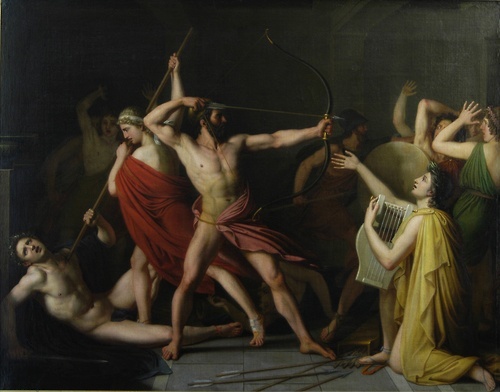In continuing with the theme in my previous article, I want to highlight some lessons from Homer’s Odyssey that I thought were important. The Odyssey is a subtler poem than the Iliad. It is perhaps not as high on raw brilliance and directness of narrative technique, but it is a poem that is more relatable to our everyday lives as human beings.
Whereas the warfare portrayed in the Iliad takes the human condition to the extreme, the Odyssey has more lessons on how to navigate peaceful life, which is still wrought with underlying difficulties. Most of us probably won’t adventure past Scylla and Charybdis (or sleep with goddesses), but the psychology and social relationships portrayed in the Odyssey have much to teach us.
A Man Must Go Through Misfortune Before Being Fortunate
The winds rushed out and bore them far out to sea, weeping as their native land faded on the horizon. When I woke up and saw what had happened I thought long and hard about whether I should just go over the side and end it all in the sea or endure in silence and remain among the living. In the end I decided to bear it and live. (10.53-59)
Throughout the Odyssey, Odysseus displays a mental fortitude that is absolutely crucial for his ability to be fortunate in the end. Although he suffers reverse after reverse after reverse, he still manages to stay in the game and not let these losses get to his head. The way he manages his emotions showcases what is necessary for a man to get ahead through his misfortunes. Most people do not have this fortitude.
His mental fortitude is perhaps best put on display in the lines above, where he was so close to reaching Ithaca after an already-hard journey, only to have his homecoming snatched away by the cruel, fickle winds of fortune, in this case in the form of his men.
We’ve all probably suffered similar reverses – with women, with money, with the very arc of our well-being.
It is often said in the sphere that the price of success is failure. You must not let these failures damage you and instead learn from the facts of said failures while discarding the emotional baggage that comes from them.
Some people will have a natural advantage in these things, but this is a fortitude that everyone, regardless of their starting position, must consciously cultivate. If you do not, your storm clouds may not disappear because you will give up and sink into Poseidon’s sea before the sun shines on your face.
You Must Maintain A Healthy Skepticism Of The Women Close to You
The Odyssey is the more classically “red pill” of the two Homeric epics in that the poem is entirely premised on the nature of women and the caution men must take when navigating their relations with the opposite sex, even their own wives. The most enduring lesson is that you must think first and foremost with your big head and be ever on the lookout for a woman potentially manipulating you.
Agamemnon, whose example is used as a stark warning to Odysseus, failed to do this. Flush with his life’s greatest triumph in the successful conclusion of the Trojan War, the most powerful Achaean king was one of the few to make it home without much trouble.
His glory was cut terribly short however, as he did not realize that in his absence, his wife Clytemnestra betrayed him, sleeping with Aegisthus, who took power in Mycenae in Agamemnon’s absence. Not suspecting this at all, Agamemnon rushed home, only to be murdered.
He warns Odysseus in the underworld to avoid the same fate:
Son of Laertes in the line of Zeus, – no, Poseidon did not sink my fleet at sea after hitting us hard with hurricane winds, nor was I killed by enemy forces on land. Aegisthus was the cause of my death. He killed me with the help of my cursed wife after inviting me to a feast in his house, slaughtered me like a bull at a manger. So I died a most pitiable death, and all around me my men were killed relentlessly, like white-tusked swine for a wedding banquet or dinner party in the house of a rich and powerful man. You have seen many men cut down, both in single combat and in the crush of battle, but your heart would have grieved as never before at the sight of us lying around the wine-bowl and the laden tables in that great hall. The floor steamed with blood. But the most piteous cry I ever heard came from Cassandra, Priam’s daughter. She had her arms around me down on the floor when Clytemnestra ran her through from behind. I lifted my hands and beat the ground as I lay dying with a sword in my chest, but that bitch, my wife, turned her back on me and would not shut my eyes or close my lips as I was going down to death. Nothing is more grim or more shameless than a woman who sets her mind on such an unspeakable act as killing her own husband. I was sure I would be welcomed home by my children and all my household, but she, with her mind set on stark horror, has shamed not only herself but all women to come, even the rare good one.
…
So don’t go easy on your own wife either, or tell her everything you know. Tell her some things, but keep some hidden. (11.415-460)
It is Odysseus’ caution in this area that wins him praise from Athena:
Ah, that mind of yours! That’s why I can’t leave you when you’re down and out because you’re so intelligent and self-possessed. Any other man come home from hard travels would rush to his house to see his children and wife. But you don’t want to hear how they are until you test your wife, who as a matter of fact, just sits in the house, weeping away the lonely days and nights. (13.341-349)
Odysseus, with the help of Athena, concocts a disguise to carefully test his wife, making sure that she is up to no shenanigans with any of her suitors. It is only when Penelope carefully passes this test that Odysseus can truly put his mind at ease and retake his home.
Women Will Always be Attracted to Superiority
Daughter of Icarius, wise Penelope, of course it’s preposterous that this man would marry you. That’s not what we’re worried about. But we are embarrassed at what men – and women – will say: ‘A bunch of weaklings were wooing the wife of a man they couldn’t touch – they couldn’t even string his polished bow. Then along came a vagrant who strung it easily and shot through the iron.’ That’s what they’ll say, to our lasting shame. (21.339-347)
A very real reason why Penelope was likely not attracted to the suitors is because they were simply inferior to her husband. Whereas Clytemnestra had some motivation for revenge against Agamemnon from the start due to the sacrifice of Iphigenia, Penelope had no such motivations. Odysseus was to her a man like a god, and it is painfully obvious that none of her suitors in the Odyssey can match him. This is made crystal clear by Antinous’ pathetic whimpering above – the suitors were so inferior to Odysseus that they could not even string his bow.
The suitors’ uncivilized nature and violation of the laws of hospitality are simply outward manifestations by Homer signaling their innate inferiority, despite the fact that these men were all wealthy nobles. It should not be surprising to many here that Penelope, an even higher status woman as a queen, was not exactly enamored with them in a primal way, devoted to her husband as she was.
She was devoted to Odysseus because he was a great man, and rendered greater by the inferiority of the suitors.
The Importance Of Fatherhood And Male Mentorship
Telamachus, with whom the poem begins, is a character that is quite relatable to many modern men. He, like so many today, grew up without a father. Through those critical childhood and adolescent years, Odysseus has been at war or wandering the seas.
Growing up only in the presence of women, Telemachus begins the poem as a timid, confused 20-year-old that nevertheless has potential for greatness. It is at this point – vulnerable, constantly at the mercy of the suitors, that Telemachus receives the first aid on his path to realize his masculinity and assume manhood from the goddess Athena, who is a force representing female support for male greatness.
Nevertheless, it is not Athena who Telemachus learns from. In the absence of his father (and in a quest to find information on him), Telemachus sees two of his father’s peers – other great men and veterans of the Trojan War, Nestor and Menelaus. They tell him stories of his father, and Menelaus provides information on Odysseus’ possible whereabouts which he gained from his own adventures.
Telemachus not only learns more of his father and the legacy that he should attempt to live up to, equally crucially, he observes how other great men behave – how they conduct their affairs, maintain their homes and give and receive hospitality. Thus far, the only consistent male examples in Telemachus’ life (that are actually his peers as opposed to slaves) have been the suitors and they, despite their noble lineage, do not behave as men ought to behave.
Telemachus is a fast learner, and his brief time with Nestor and Menelaus is very well-spent. He also makes an important friend in Nestor’s son, Peisistratus, which displays the importance of male brotherhood that Telemachus has also lacked in his life.
Telemachus, returning to Ithaca with a newfound confidence, is then fully initiated into the world of manhood by at last meeting with his father. The two subsequently plot the destruction of the suitors, thus assuring that Telemachus will someday assume his father’s place, symbolized by Telemachus’ ability to string his father’s bow (it was only Odysseus that silently nodded him off from doing so).
In a world of increasing single motherhood, the need for a boy to learn how to become a man from other men and only from other men is increasingly shunned or explained away.
We can see the change in Telemachus from the start of the Odyssey:
Suitors have latched on to my mother, against her will, and they are the sons of the noblest men here. They shrink from going to her father Icarius’ house so that he could arrange his daughter’s dowry and give her away to the man he likes best. Instead, they gather at our house day after day, slaughtering our oxen and sheep and fat goats, living high and drinking wine recklessly. We’ve lost almost everything, because we don’t have Odysseus to protect our house. We can’t defend ourselves. If it came to a fight we would only show how pathetic we are. Not that I wouldn’t defend myself if I had the power. (2.54-67)
Telemachus after the end of his journey is a vastly different man:
You’ll soon see what I’m made of, father, and I don’t think you’ll find me lacking. (16.328-9)
This simple beginning of his reply to his father signifies that he has a newfound confidence, is unafraid to confront his enemies when the time is right, and is planning accordingly with his father to bring about their destruction. Although he does make one tactical error in the battle itself (by leaving the door to the storeroom for the weapons open, allowing the suitors to arm), this error is unimportant in comparison to his wider development. All men make mistakes. This mistake turned out not to be so costly. Athena was there, after all.
The very last thing Telemachus says in the Odyssey is:
The way I feel now, I don’t think you’ll see me shaming my ancestors, as you put it, father. (24.531-2)
Telemachus’ implicit ascension to manhood is acknowledged by his grandfather, Laertes:
What a day, dear gods! My son and grandson going head to head to see who is best. (24.534-5)
Telemachus, through his inclusion in male-only spaces (comprised of the right men), has learned how to be a man, and his future is bright. In this regard, Telamchus is to me an icon for the modern man growing up in a feminist, politically correct society. His growth is at once indicative of the way forward personally, and what we should be aiming for socially.




Good article.
Women can bitch all they want that history excludes women… is sexist and patriarchal blah blah blah… but at the end of the day it is mostly men who pick up history books to share wild tales of tragedy and adventure.
If women want history they should start writing books. Men have been writing history books for as long as we can remember.
Men always looked back at history.. maybe from the yearning for more traditional times..
When men were virile and virtuous at the beginning. It seems that socially things always go in cycles as many ancient myths attest to.
Hmmm, do you guys hear what you’re saying? I get “anger” in the tone of your posts. Ahhh.. hmm, .whatever, it’s good for the men like me who are awake-n-aware… I dig and I adore most women, so you guys go ahead and blow yourselves out of any possible chances being with a good woman. I wish you Machivalian luck gentlemen, in meeting a beautiful mature woman with that attitude. Personally, I like it…. it creates better odds for me.
You can’t label all women as bad, its the immature women that causes the problems, and I bet, caused your anger tone too. Plus, we own 1/2 the problems… it’s in immature women nature to exploit a man’s weakness in relying only on a woman’s outwardly beauty, regardless of her character make-up. (mutal trauma fellas).
Well, for the most part, average women tend to be selective about the bits of history they are emotionally drawn to.
Unfortunately, women (feminazis dykes in training)have written thousands of books all about nothing meaningful to historical content. Only; how to guides on controlling men, cultural marxism, cooking, fashion, self worship and gossip. We have a code of honor in just about everything, we do as men. Seeing womens hypergamous nature displays no code, no honor or any sense of morality especially in their own historically written words.
It can be difficult not to resent them for that. But it’s what they are. I don’t expect my car to sail or my boat to fly. They just don’t do that. Women have evolved to be treacherous because in the natural environment they can not possibly compete with males. So they must learn to manipulate men for survival and they must turn their coats as soon as the wind changes in the most craven fashion. Don’t expect them to understand or appreciate any notion of honor or duty.
Many years ago when I left to fight wars as a teenager my female relatives were mystified why I would embrace front line combat rather than some safer position that would benefit me more down the road. Unable to see through anything other than the filter of self-interest, what was obvious to me was a totally inexplicable to them.
“women have written thousands of books all about nothing meaningful”.
Dude, lol, why did you vote up Marco Polo?
😉
The entire poem is a warning against hubris. Had not Odysseus (like all heroes of Greek myth- Icarus, Phaethon, etc.) deigned to believe he was more significant than he was, Poseidon would never have decided to teach him such a lesson. Men must learn they are not gods. I find the lesson of the Lotus-Eaters one of the most relevant in our ‘internet is the opiate of the people’ age.
er *dared to believe*
Ah, hubris. The downfall of many a great man.
I need you guys to help me answer some questions.
1. Does Odysseus bring suffering upon his crew by boasting after blinding Polyphemus? I always thought Poseidon went after him for that reason. He should have just sailed away.
2. Is Odysseus a coward for slaughtering the suitors? I may remember this incorrectly, but I think he had somebody steal their weapons before he fought them all. You would think an honorable and brave leader would not slaughter men who cannot fight back. Then again, he was outnumbered and the suitors had no honor themselves and were in his home. I was always bothered by the fact that he did not fight them while they were armed.
1. Ultimately he does (or partly does, the part I wrote about how they untied the bag of winds was unfortunately edited out of this article), but they ensure their deaths by eating Hyperon’s cattle on Thrinacia.
2. A lot of them did get armed though because Telemachus leaves the door to the storeroom open, but Athena wasn’t going to let them win anyway.
Ah, thanks for the answers. I guess the suitors were doomed then if even Athena wanted them gone. I feel sorry for Amphinomous as he was not all bad, but he remained a suitor.
I wonder if Athena would have interfered if one of the suitors gained the upper hand. Then again, they could not even string the bow, so she was probably sure they would not get that far.
I forgot all about the bag of winds. Sad that did not stay in the article.
I’ll probably post the unedited version on my own blog.
This is classic Greek epic where the mortals are strong but have no fears to call upon and use the strength of the gods. A good lesson for men of today …
Nothing unmanly about putting the odds in your favor when it comes to fighting or war.
Best scene of the movie is the slaughter of the unworthy at the end. Epic scene
Holy Shit! You have a pudgy spot?!? On your tummy?!?
great article… epic poem (literally).
Given my namesake’s prominent featuring in this essay, I must agree with it wholeheartedly. I actually chose my pseudonym as an homage to my own father, a veteran of the cold war and my very own Odysseus.
I loved this book as a child, read it and re- read it many a time. Even though my father was away working most of the time, these stories and myths of great men showed me the way through the hardest years.
Myths can teach us much, forge our character and resolve. There is a reason this story and others like it have passed on through the ages. Great article indeed.